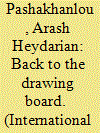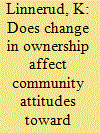| Srl | Item |
| 1 |
ID:
121860


|
|
|
|
|
| Publication |
2013.
|
| Summary/Abstract |
Offensive realism argues that states committed to survive are nevertheless condemned to participate in a relentless struggle for power, and it holds the structure of the international system as the cause of this tragic outcome. This article subjects the logic behind this tragic worldview and the explanatory power of offensive realism to a careful and comprehensive scrutiny. This in-depth analysis of offensive realism amounts to a substantial critique of the theory as it fails to logically generate the brutish world it presupposes and is plagued by significant shortcomings in its explanatory model. These findings suggest that offensive realism cannot provide useful theoretical lenses for explaining and understanding international politics, even when it is assessed on its own terms.
|
|
|
|
|
|
|
|
|
|
|
|
|
|
|
|
| 2 |
ID:
141094


|
|
|
|
|
| Summary/Abstract |
Debates about whether China's rise poses a threat or an opportunity for Taiwan have settled into a realist assumption that Beijing will continue to upset the balance of power and a liberal approach that believes the benefits of economic interdependence are leading to greater gains. Missing from this debate is a nuanced consideration of how Taiwan's policy elites view themselves and their position in cross-Strait relations. Taiwan's decision makers' views are deeply affected by, and interact with, factors and institutions on and beyond the island. This article offers a model of political processes – the staying power of the status quo and order of movement – as a possible route towards an explanation for Taiwan's position on cross-Strait negotiations. The conclusion is that the status quo position – de facto but not de jure independence – is becoming more entrenched with time. Taiwan's colours of partisanship, Blue and Green, are blending into Aquamarine.
|
|
|
|
|
|
|
|
|
|
|
|
|
|
|
|
| 3 |
ID:
166709


|
|
|
|
|
| Summary/Abstract |
The distributed nature of many renewable energy technologies allows for new ownership models as well as frequent ownership changes. We analyse whether a change in ownership negatively affects community attitudes toward a hypothetical small-scale hydropower plant. We use a two-stage framing experiment and a student sample. We find that a change in ownership has a significant negative effect on their attitudes toward the project, irrespective of whether the change is from a national to a local owner or vice versa. We interpret this finding as an example of a status quo bias, that is, a preference for the current state of affairs. A status quo bias makes renewable energy transitions more challenging, at least initially. Over time, as the status quo shifts, this may become less of an issue. We conclude the paper by discussing the robustness of our findings as well as whether and how policymakers can reduce the impact of such cognitive biases.
|
|
|
|
|
|
|
|
|
|
|
|
|
|
|
|